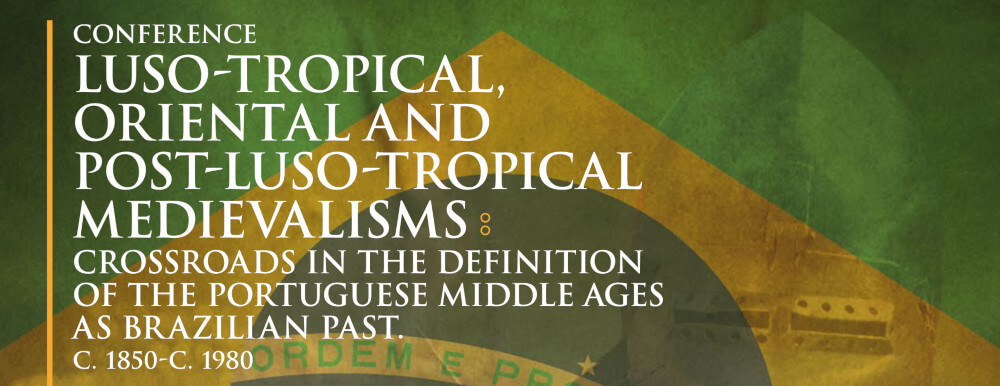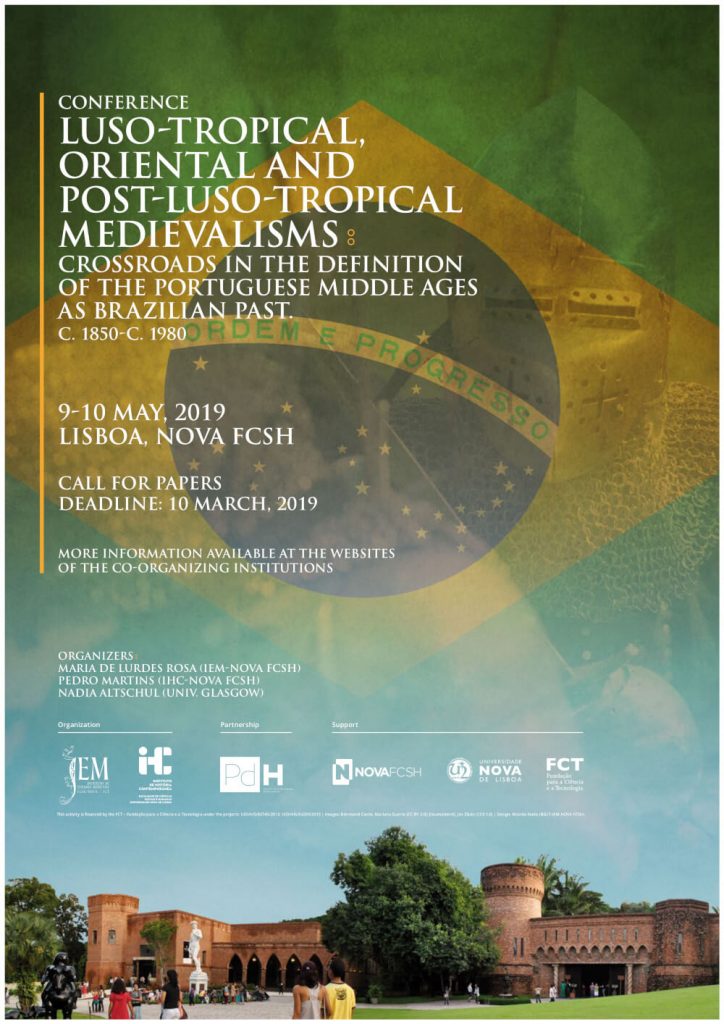maio, 2019

Detalhes do Evento
Internacional conference about the nineteenth- and twentieth-century uses of the Middle Ages in constructions of Luso-Brazilian national identities. Call open until 19 March. Luso-Tropical, Oriental and post-Luso-Tropical Medievalisms:
Ver mais
Detalhes do Evento
Internacional conference about the nineteenth- and twentieth-century uses of the Middle Ages in constructions of Luso-Brazilian national identities. Call open until 19 March.
Luso-Tropical, Oriental and post-Luso-Tropical Medievalisms:
Crossroads in the definition of the Portuguese Middle Ages as Brazilian past.
C. 1850-C. 1980
Brazil as a product of Portuguese colonization and the political processes of the modern and contemporary period is a nation whose identity, similarly to the rest of American nations, has been mostly built recurring to a post-medieval past. This characteristic, however, did not preclude Brazilian historical culture from incorporating elements of the European and especially Portuguese Middle Ages, which in turn influenced the image that Brazilians created about themselves. Particularly relevant to this process was the work of Gilberto Freyre (1900-1987), an intellectual whose writings were politically appropriated by the Estado Novo in Portugal but who also left a profound mark in narratives about Brazilian national identity. The idea of medieval Portugal as a melting pot of diverse cultures (Christians, Muslims and Jews) had been advanced by several authors since the 19th century, and it also served as a basis of Freyre’s theories regarding an alleged Portuguese ability to create uniquely successful relations with people in the tropics – theories which, at the time of their publication, were controversial in Brazil and would be later described as “Luso-tropicalism”.
After 30 years of Gilberto Freyre’s death, the Institute for Medieval Studies (IEM), the Institute of Contemporary History (IHC) and the journal Práticas da História — Journal on Theory, Historiography and Uses of the Past opened a scholarly discussion on the nineteenth- and twentieth-century uses of the Middle Ages in constructions of Luso-Brazilian national identities in April 2018. Following that first exploratory seminar and with the aim of summing up its conclusions and opening new perspectives, a conference will be held the 9th and 10th of May at the NOVA School of Social Sciences and Humanities of Universidade Nova de Lisboa.
Programme:
9 May
14h00 – Lunch
14h45 – Opening
15h00 – “Hispanotropicologia e hipótese do homem ibérico do Renascimento”, Pablo González Velasco
15h30 – “Histórias sem fronteiras: o Brasil que Gilberto Freyre criou”, Marcos Cardão
16h00 – Debate
16h30 – Coffee break
16h00 – “Arminhos, onças, gaviões e outros signos medievais e epopeicos brasileiros: a heráldica no Romance d’A Pedra do Reino de Ariano Suassuna”, Miguel Metelo de Seixas
17h30 – “O medievalismo na arquitetura brasileira do século XX: o caso do Castelo de Itaipava”, Dinah Papi Guimaraens, João Batista da Silva Porto Junior and Marina Vasconcellos de Carvalho
18h00 – Debate
10 May
10h00 – Keynote lecture – Hilário Franco Júnior: “O mundo de ponta-cabeça sertanejo: O País de São Saruê”
10h45 – Debate
11h15 – “O ‘Dom Sebastião brasileiro’: a construção da imagem messiânica de Plínio Salgado como chefe da Ação Integralista Brasileira (1932-1937)”, Rodrigo Santos de Oliveira e Michelle Vasconcelos Oliveira do Nascimento
11h45 – “Do orientalismo de A. Lopes Mendes nos escritos sobre O Oriente e a América…”, Ana Paula Menino Avelar
12h15 – Debate
13h00 – Lunch break
14h30 – “As sereias que singraram o Atlântico”, Andréa Caselli
15h00 – “O sertão e suas cores: ecos do medievalismo português no nordeste brasileiro”, Priscilla Pinheiro Quirino
15h30 – “As raízes medievais na construção da identidade jurídica brasileira”, José Djalisson Santos Oliveira
16h00 – Debate
16h45 – Synthesis
Maria de Lurdes Rosa and Pedro Martins
Among the suggested topics are included:
The cultural and political contexts of the production of “Luso-tropicalism” and their relations with the various representations of the Portuguese Middle Ages;
The authors that influenced Gilberto Freyre’s theories on medieval Portugal;
The relation between Gilberto Freyre’s theories and orientalist discourses or representations of Portugal and Brazil;
The ways in which Portuguese and Brazilian contemporary historiographies have interpreted the “influence of medieval Portugal” in the development of Brazilian society until present times, considering the different views (either more “traditionalist” or progressive”) on the Portuguese Middle Ages produced during the 20th century.
Call for papers (📎 PDF)
Instructions for the submission of paper proposals
Proposals, consisting of an abstract with maximum 300 words and a small biographical note (max. 60 words), should be sent until 10 19 March 2019, to medievalismos@fcsh.unl.pt, in one of the following languages: Portuguese, English, French or Spanish.
Acceptance of proposals will be communicated by e-mail on 25 March 2019.
Essays will be published in 2020 in a Special Issue of the peer-reviewed journal Práticas da História.
A 6.000 to 10.000-word version of the conference paper should be sent to the aforementioned email until the 30th of November 2019 following the submission guidelines of Práticas da História.
After a positive assessment by the anonymous peer-reviewers, the final version of the submitted texts will be published in a thematic issue of the journal during the second half of 2020.
Organising committee
Maria de Lurdes Rosa (IEM – NOVA FCSH)
Pedro Martins (IHC – NOVA FCSH)
Nadia Altschul (University of Glasgow)
Tempo
9 (Quinta-feira) 2:00 pm - 10 (Sexta-feira) 5:30 pm
Organizador
Institute of Contemporary History - NOVA FCSH, Institute for Medieval Studies - NOVA FCSH, and Práticas da História

